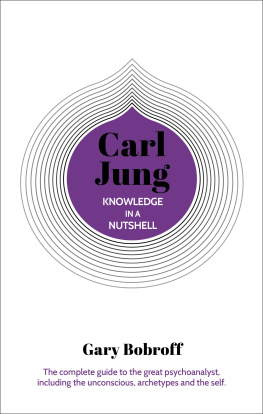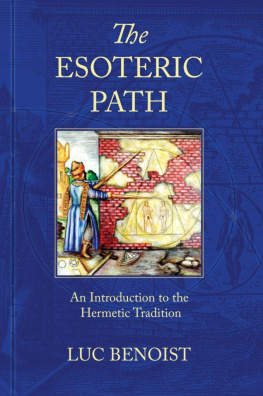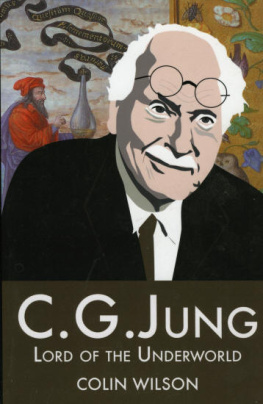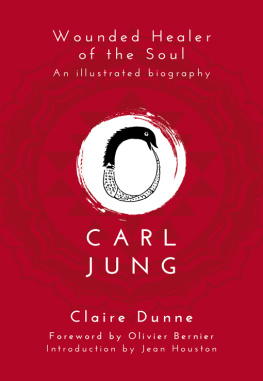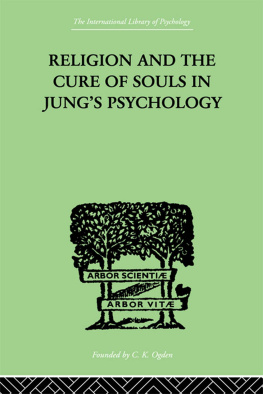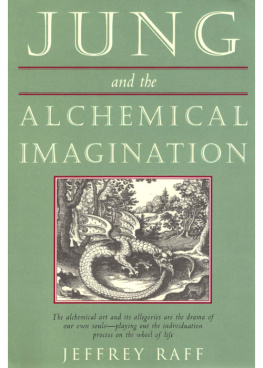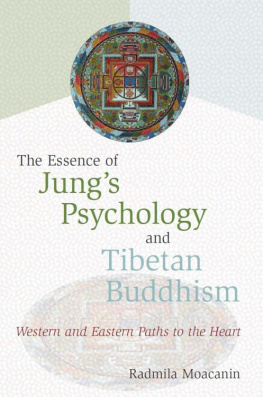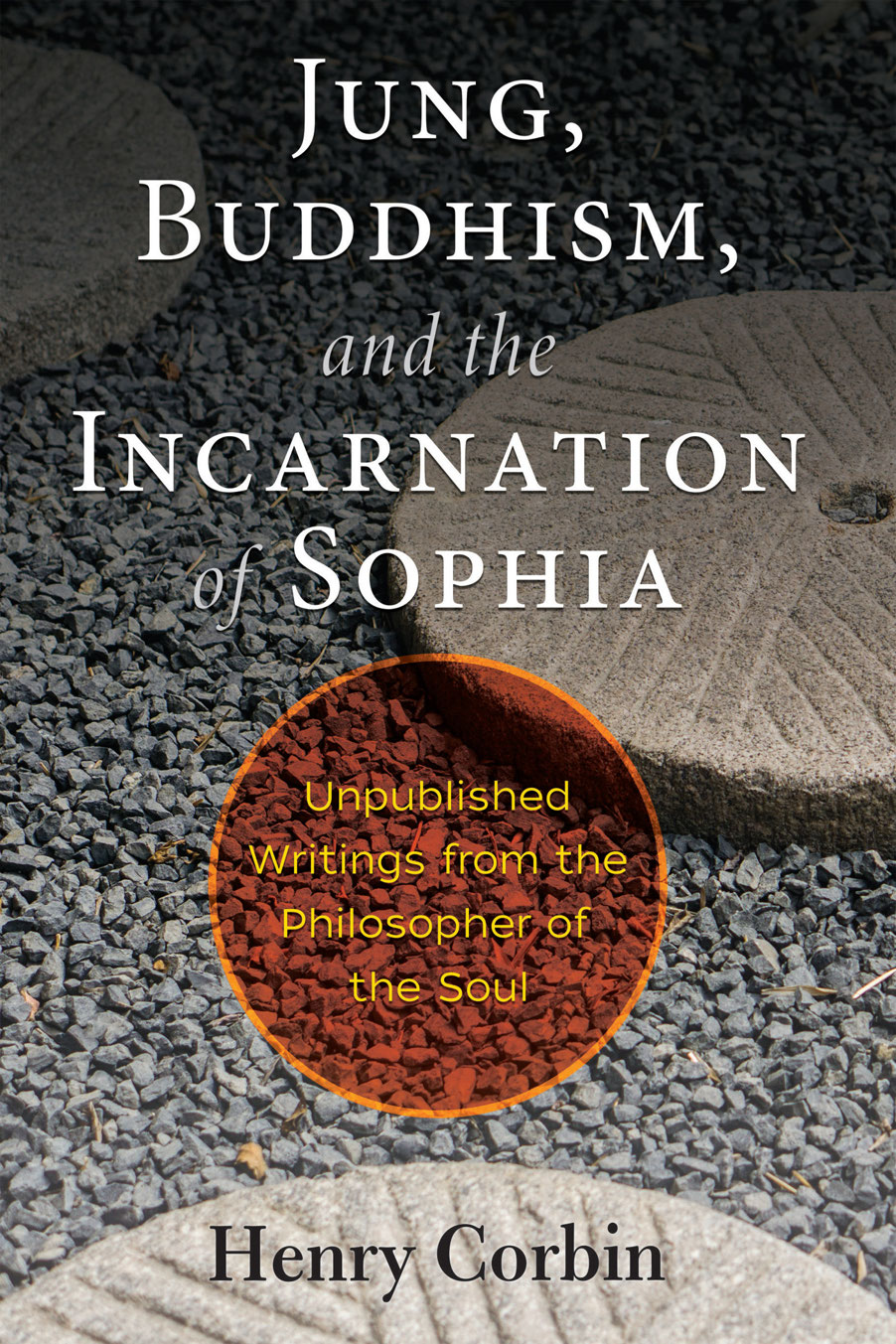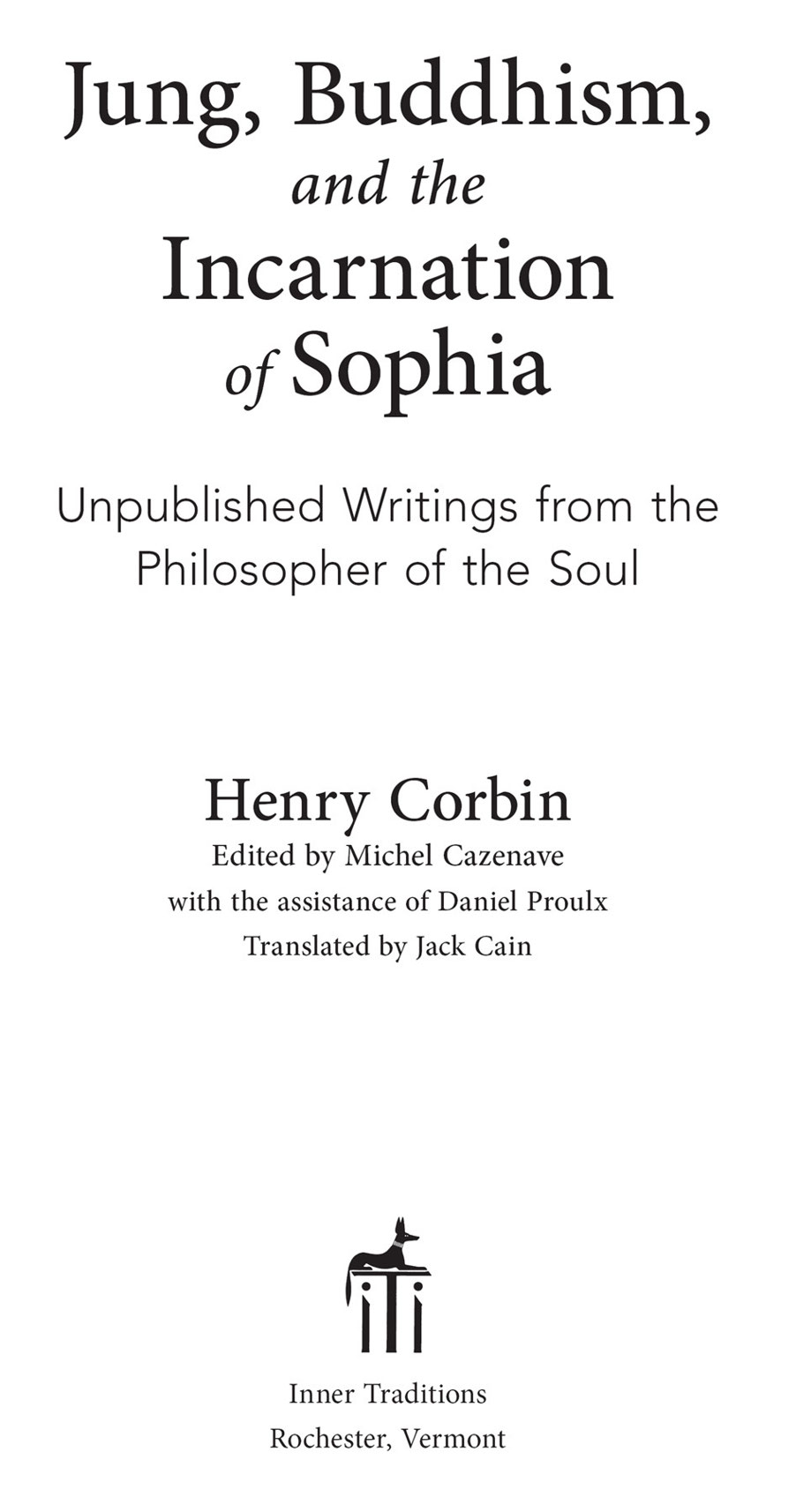JUNG, BUDDHISM, and the INCARNATION of SOPHIA
That Henry Corbin was one of the great religious thinkers of the 20th century will be apparent to all who delve into this brilliant collection of his previously unpublished writings on Carl Jung and Buddhism, the gnostic Sophia, and Sufism. Corbins insights into the profound roots of Jungs teachings make this essential reading for those who ponder the ties that bind psychology and spirituality and all the great religious traditions to one another.
JEFF ZALESKI, EDITOR AND PUBLISHER OF PARABOLA MAGAZINE
Jung, Buddhism, and the Incarnation of Sophia is where two astounding explorers of the inner cosmos, Henri Corbin and Carl Jung, meet in their insightsan intriguing octagon of mirrors surrounding the illuminated soul.
CHRIS H. HARDY, PH.D., AUTHOR OF THE SACRED NETWORK, DNA OF THE GODS, AND WARS OF THE ANUNNAKI
PREFACE FROM THE EDITOR
Iam publishing these documents just as Stella Corbin kindly entrusted them to me. And specifically in the form in which she suggested they be presented.
Readers will not then be surprised to find two pieces by me that open and close this volumesomething that I would never have undertaken on my ownbut, once again, the publication entrusted to me has required me to do so!
In the same way, I know quite welland Daniel Proulx (a religious and philosophical scholar specializing in Henry Corbins thinking) pointed it out to me at lengththat Corbins study of the connections between Jung and Buddhism (Buddhism as it was presented by D. T. Suzuki) has been organized in various ways. I decided on this point to conform strictly to the manuscript that was typed by his own hands and provided to me by Mrs. Corbin, so that I would be respecting her wish to publish this research together with Corbins various texts on the aspects of Sophia that are found in Jungs work.
Regarding also the documents appearing in the appendices, which she gave me with specific instructions as to their placement: I know very well that the sequencing of this collection could be contested, but I would like it to be understood that, if I bring to light and put forward these facts, it is certainly not in a spirit of trying to place elsewhere the responsibility for any part of it but simply to delineate a faithful adherence imposed by the passing of the person whom we are dealing with here.
Finally, I cannot end without recognizing once again the invaluable collaboration of Daniel Proulx who not only gave me the necessary encouragement, but above all supported the proper publication of these texts through his painstaking research in storage boxes of Corbin archives at the cole pratique des hautes tudes.*1
MICHAEL CAZENAVE
MICHAEL CAZENAVE (June 9, 1942August 20, 2018) was a French philosopher and an expert on the work of Carl Jung. He was a prolific writer with more than fifty books to his credit and was longtime advisor to the head of programming for the prestigious France Culture, a French public radio channel featuring historical, philosophical, sociopolitical, and scientific content.
HENRY CORBIN, PHILOSOPHER OF THE SOUL
MICHEL CAZENAVE
It will soon be three years since Henry Corbin departed this life.*2 His excessive modesty as a researcher and thinker perhaps prevented him during his lifetime from occupying his legitimate position at the horizon of French thoughtand doubtless beyond: European thought and Western thought as well. An enormous misunderstanding developed around him: as an orientalist for the philosophers and a philosopher for the orientalists, no one quite knew where to place him, nor was it understood that it was moreover this very indefinable character that doubtlessly legitimized the unfolding of his work. And his work was specifically elsewhere than at the philosophical dead end in which we have been imprisoned now for nearly fifty years.
Philosopher in actual fact, Henry Corbin was indeed that to the very depths of his souland I use the word soul deliberately, because Corbin had quite rightly understood, and was among the first to understand, that a philosophy of being was also, and necessarily so, a philosophy that posited the rigorous reality of the soul. Several of Corbins books have recently appeared one after the other: Temple et contemplation (Temple & Contemplation; Flammarion, 1980), Le Paradoxe du monothisme (The paradox of monotheism; LHerne, 2003), La Philosophie iranienne islamique aux xviie et xviiie sicles (Islamic Iranian philosophy of the seventeenth and eighteenth centuries; Buchet-Castel, 1994), as well as the monumental and, for the foreseeable future, indispensable Cahier de lHerne: Henry Corbin (Herne notebooks: Henry Corbin; LHerne, 1981) edited by Christian Jambet.
This outpouring of published works is meaningful in itself. If Corbins thought has really not yet reached a wide audience, I have often been led to realize how it has been influencing more and more, and more and more deeply, new generations of young philosophersor researchersthose seeking knowledge in the neighboring domains of psychology and anthropology; for example, where Corbin provides them with operative conceptual tools. The time has come today for such a magnetic pole to break the wall of silence so the fruits of an entire life devoted to the search for Knowledge might flood restless souls with Light.
It has been a long timea very long time nowthat Western philosophy has split at its very core and given rise to two antithetical pairs that are connected by their respective terms: intellectualism and empiricism, idealism and materialism. The result we can see then is the wall that present-day philosophy is up against, the dead end it has come to, and its dramatic inability to bridge the divisions that it has itself created. This philosophy has come to a place where the reality of the soul, in its turn, has sunk; it has been emptied of any possibility of existing within the pitiless struggle between the worlds opacity and endless concepts.
It is specifically this fratricidal struggle that Henry Corbin wants to go beyond, and he does so by rising above it in such a way that dogmatisms shatter and ideologies fall from the false thrones they have accorded themselves. Within the kingdom of the soul thus reconquered, as an intermediate world between our perceivable universe and the divine unintelligible, there can finally developor be redevelopeda philosophy of the Active Imagination, which has been in all ages that of true mystics, poets with hearts aflame, lovers, and those crazed with God.
It is in fact patently clear that official Western philosophy has failed in its mission, which was to think Being. Because, if Being is, it is clearly of absolute transcendenceand to skirt this obstacle, metaphysics has all too often positioned, at the core of its thinking, a supreme Be-er, an extreme Exister if you like, which when all is said and done is an idol, instead of this absolute God the source of which all thirsty souls are searching for. On my bed, at nighttime, I sought him whom my heart loves*3to which respond the words of Teresa of vila in her poem Aspirations toward Eternal Life: I live without living within myself, / and in such a way I hope, / I die because I do not die.
Next page

